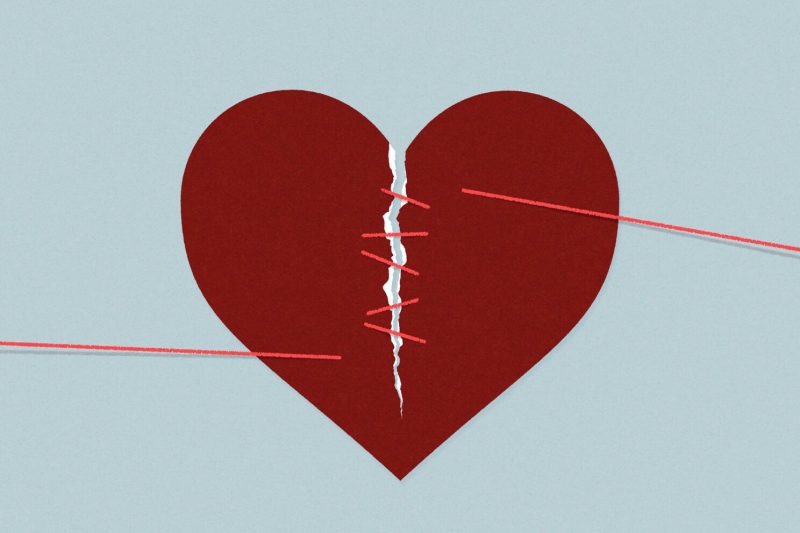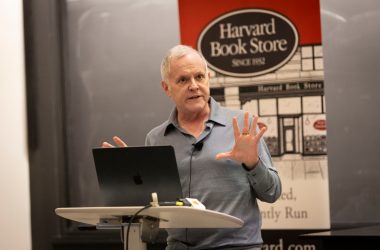Illustration by Hendrik Dahl/Ikon Images
Health
‘Harvard Thinking’: Forgiving what you can’t forget
Wronged and can’t move on? In podcast, a theologian, a psychologist, and a public health expert discuss why and how to heal.
What is forgiveness? In order to answer that question, it’s helpful to start with what forgiveness is not.
“Forgiveness is not the same as condoning the action, excusing it, or saying it’s all right. It’s not the same as foregoing justice,” said Tyler VanderWeele, the John L. Loeb and Frances Lehman Loeb Professor of Epidemiology at the Harvard T. H. Chan School of Public Health and the director of the Human Flourishing Program. “My preferred definition for forgiveness is replacing ill will toward an offender with goodwill.”
But it’s not always that simple. Laura Thompson, a clinical and consulting psychologist, suggests that even neutral emotions toward the offender indicate forgiveness has been achieved. And Matthew Ichihashi Potts, the Plummer Professor of Christian Morals and the Pusey Minister in the Memorial Church, takes it one step further: One can still hold on to negative feelings, but make the choice to not return “harm for harm.”
“Forgiveness has been used by institutions to require people to give up their anger, sometimes anger which is justified,” Potts said. “Especially for victims of abuse, trauma, or violence, that deep pressure to forgive … can be burdensome and retraumatizing.”
Still, forgiveness is good for us.
“We see all kinds of mental health and physical health benefits as a result of [forgiveness],” Thompson said. She recognizes that forgiveness is difficult for many people, and even the term forgiveness has become loaded with expectations, guilt, and shame. Perhaps reframing forgiveness as “grudge management” creates more opportunities for people to explore these painful experiences and find healing.
In this episode, host Samantha Laine Perfas, VanderWeele, Potts, and Thompson talk about the challenges of forgiveness — and why it may be worth the effort.
Transcript
Laura Thompson: There’s often a lot of pressure on the group or the party with less power to forgive so that it’ll just feel better for everybody and go away. And that just doesn’t work. That’s not forgiveness.
Samantha Laine Perfas: It’s not uncommon for individuals to hold grudges for years, if not entire lifetimes. Yet forgiving someone is good for us. It’s linked to better health, both physical and mental, and it has the power to deepen relationships in profound ways. So why is it so difficult to forgive someone when we’ve been wronged?
Welcome to “Harvard Thinking,” a podcast where the life of the mind meets everyday life.
Today we’re joined by:
Tyler VanderWeele: Tyler VanderWeele, I’m the Loeb Professor of Epidemiology at the Harvard T. H. Chan School of Public Health and also the director of the Human Flourishing Program.
Laine Perfas: He studies links between religion and health, as well as the science of happiness and flourishing. Then:
Matthew Ichihashi Potts: I’m Matt Potts. I’m the Plummer Professor of Christian Morals and the Pusey Minister in the Memorial Church at Harvard University.
Laine Perfas: He specializes in Christian theology and wrote the book “Forgiveness: An Alternative Account.” And our third guest:
Thompson: Laura Thompson, I’m a clinical and consulting psychologist.
Laine Perfas: She was a fellow at McLean Hospital and the Cambridge Health Alliance. Today, she mostly does clinical work and teaches and trains others in mindfulness through the Oxford Mindfulness Foundation and privately.
And I’m your host, Samantha Laine Perfas, and a writer for the Harvard Gazette. In this episode, we’ll talk about why forgiveness might be worth it, even if it’s hard.
Let’s kick off the conversation with some definitions. How do each of you define forgiveness?
Thompson: This is an interesting question. In the late ’90s, there was a lot of funding made available very generously to promote the research of forgiveness. And it really sparked this question of how do we think about forgiveness? There are these lay definitions that you might find in the dictionary that’ll say things like releasing resentment or anger, but sometimes included in that are things like condoning or pardoning. And from the psychological perspective, there really is a difference there; in looking at what’s happening psychologically when we forgive, it’s helpful to take a step back and think about what creates the conditions for forgiveness to even be an option. Something happens that really violates a person’s sense of either how another person should behave or should be, how the world should be, how they themselves should be. And in that, there’s this natural response of anger or anxiety or sadness, and there’s this opportunity for all kinds of ways to respond to that, and forgiveness is one. And it’s essentially a shift in the thinking, the feeling, the motivation, and the behavior about this transgression from the negative to either the neutral or the positive.
VanderWeele: Just building a bit on what Laura was saying, my preferred definition for forgiveness is replacing ill will toward an offender with goodwill; instead of wanting something bad to happen to them, wanting good to come to them. But understood in that way, forgiveness is not the same as condoning the action, or excusing it, or saying it’s all right. It’s not the same as foregoing justice. One can pursue justice and still want what’s ultimately good for the offender. It’s also not the same as reconciliation; in some cases it may be that the nature of the offense is that two people shouldn’t reconcile. But it’s wanting what’s good for them.
Potts: I think my definition is similar to the others’ but I approach the question as a scholar of religion and a moral theologian and a moral philosopher. In my pastoral experience, the association of forgiveness has been used by institutions to require people to give up their anger, sometimes anger which is justified, right? So the way I think about forgiveness is actually it’s not giving up a grudge necessarily. You might hold a grudge and still forgive. For me, I begin my forgiveness where I feel like the virtue has been abused by power, toward pressuring folks to give up their anger too prematurely, or pressuring folks to reconcile prematurely. And I’ve defined forgiveness as foregoing retaliation. I want to suggest that forgiveness tries to develop an idea of justice where we can imagine a future where we don’t need to return harm for harm or we can move on into the future without retaliation, but with still some sense of justice going forward. And so maybe that means grudges, maybe it means anger. It can include negative affect or negative emotion that might include a reluctance or refusal of reconciliation. But what there isn’t is continued retaliatory and reciprocal violence.
Laine Perfas: Just to summarize: Tyler, you are saying forgiveness is replacing ill will with goodwill; Laura, you’re saying it’s replacing ill will with either goodwill or neutral will. And then Matt, you are saying that forgiveness doesn’t necessitate getting rid of your negative emotions, it’s just foregoing retaliation. Could you talk about that a little bit more, because I’m having a hard time conceptualizing how you could forgive and yet still hold a grudge.
Potts: Yeah, I think a lot of this has to do with how we would define what a grudge is, right? In the Christian tradition, forgiveness is a virtue; in the New Testament it’s a mandated virtue: You must forgive in some ways. And especially for victims of abuse or trauma or violence, that deep pressure to forgive, when it includes a pressure to reconcile or a pressure to give up anger, can be burdensome and retraumatizing to victims. One of the reasons I’m thinking about anger with respect to forgiveness is because we know that there are classes of people who are less allowed to be angry in our culture. A lot of my work developed around hearing victims’ concerns around forgiveness, around the way it transfers responsibility for the repair of wrong from wrongdoers to victims, right? I’ve heard victims’ advocates and people in my congregation who have said, “I can’t do that. Why is it on me to do this? And if I don’t do it, I’m a bad Christian?” That might be conceived as still bearing a grudge. “I don’t want to reconcile with them because I don’t trust them.” But I would say that we have to allow and afford victims the right to decide when they can trust another person enough to reconcile with them. And so much of the Christian ethic is based in an idea of what love is and loving your neighbor and loving your enemy. The idea that anger cannot coexist alongside love, I think, is a dangerous idea. I think that anger and love can go together. And if Christianity is putting pressure on victims of wrongdoing to feel a certain way, that bothers me.
Thompson: You’re pointing at something so important, I think, which is the pressure that can be there either from a religious tradition, from members of a group, and there’s been some research showing that there are pressures that prevent people from forgiving as well as those that push people to do this outward forgiveness when the internal state hasn’t shifted. What’s happening internally? The thing that really seems to undergird a challenge in this shift into the neutral or the positive is this kind of angry rumination, grieving, the kinds of things where the mind gets really caught in cycling through something over and over again. And that’s what we do in response to trauma or to things that really violate our sense of how things should be. So that response is incredibly natural and what people do. In fact, people who are forgiving at a trait level aren’t less likely to respond that way. It’s not that people don’t ever feel those feelings. It’s that they have this capacity to make that shift and a lot of what seems to help that is the capacity to release that ruminative process, that getting really caught in cyclic thinking. And we see all kinds of mental health and physical health benefits as a result of that shift. We know that depression decreases. We know that the angry rumination and anxiety decrease. And along with that, the nervous system, the part of our nervous system that gets so activated when we are in this fight-or-flight mode has this chance to go into a sort of rest-and-restore mode. And I think it opens the door for things that can happen at the societal level or just relationships within families, within a couple, all of those levels. But I think Matt’s pointing at something just so important. It’s something that I found people writing about when we did narrative research, people did write about the pressure that they felt to forgive and to forget, having forgetting somehow linked with forgiving, that somehow the offense wouldn’t be there.
VanderWeele: The psychologist Everett Worthington makes what I think is a very helpful distinction between “decisional forgiveness” and “emotional forgiveness.” And decisional forgiveness is that commitment to replace ill will toward the offender with goodwill. And that’s within our control. It’s something we can do. The emotional forgiveness is the replacement of negative thoughts, emotions, feelings toward the offender with positive ones. And that’s not entirely within our control and may not always even be appropriate. But I think the distinction is helpful both with regard to the experiential aspects of forgiveness: how we can think we’ve forgiven and then the very next day we’re experiencing anger again. We don’t have to say, “Oh, no, that forgiveness wasn’t real.” It was real, but it was decisional forgiveness. It was that commitment to replace ill will with goodwill, but that doesn’t mean that the feelings of anger aren’t going to come back.
Laine Perfas: What is actually happening in our minds, body, spirit, when we’re struggling with unforgiveness? What is it that is being triggered?
Thompson: I think that when a person experiences a transgression it shakes everything up. It’s a violation of what we expect or think should be. And that’s very disorienting, and the natural response to that is to relate to it as a threat: This is not what was anticipated. And at some level, there’s a lack of feeling of safety or OK-ness. And that does activate our fight-or-flight response. And I think that’s what we’re seeing when people are responding to transgression not in forgiveness. And it is part of the process. There is no forgiveness without that, right? Because there would be nothing to forgive. So forgiveness is this capacity to hold simultaneously the reality of this very difficult wrong, which is charged and difficult to relate to, with the possibility of not being gripped by that; of releasing and having that transform into something that, at the very least, is at a neutral point.
Laine Perfas: We often hurt people that we’re really close to, or we’re hurt by people that we’re really close to. Is it harder to forgive that transgression when it’s someone who is so close to us?
Potts: I think it can cut both ways with an offense from a loved one. It seems even more wrong. This is someone I trust, and yet wrong has been done. And so I think the fact that the offense, the transgression seems greater, makes it more difficult to forgive. On the other hand, the empirical research also suggests that when we’re in an important relationship that has tremendous potential to contribute to our well-being longer term, it’s actually a bit easier to forgive, in those cases. So I think it’s a both/and: The transgression seems worse, and yet the motivation to forgive is often greater. I tend to think in marriages or in close relationships, it is in some ways fertile ground for developing that capacity to forgive. Because even smaller offenses can seem quite upsetting when it’s someone who is trusted or who is supposed to love you. In the context of marriage and family life and working through struggles and difficulties, that can happen repeatedly. And so there’s need for repeated seeking of forgiveness and offering of forgiveness.
Laine Perfas: One of the reasons we wanted to do this episode is because there’s been more research on forgiveness in recent years showing that there are pretty powerful health benefits. Could you talk a little bit about why forgiveness might be good for us?
VanderWeele: There have been dozens and dozens of studies that have indicated that those who are more forgiving and those who forgive specific offenses over time, improve in health and well-being. I’d say the strongest effects really are on mental health, on anxiety, on depression. The effects on physical health, there’s definitely some evidence that’s a little bit more disputed in what context for what groups of people, but the evidence on mental health is now extremely solid, and this includes now also dozens of randomized trials, the same sorts of study designs we use to look at cancer treatments or vaccines have been used to look at interventions to help people forgive who want to forgive but are struggling to do so. Those who participate have lower depression and lower anxiety as well as greater sense of forgiveness after even a few weeks. I think there’s really something to the effects of forgiveness on mental health. So to my mind, forgiveness tools should be considered even in routine mental healthcare.
Laine Perfas: How does forgiveness or lack of forgiveness affect entire communities?
Potts: One of the scholars that I engage in my book is John Paul Lederach. And although he’s a theorist and trained as a sociologist, his practical job has been going into post-accord conflict situations and negotiating peace between communities that have been doing awful things to each other, sometimes for generations. And he said all the bureaucrats feel like, “OK, there’s a treaty now, let’s all go have peace. Let’s move forward. Let’s do it.” And he said, when you go into the situations, you have to realize that nobody on the ground actually believes peace is possible because they have been so deeply hurt and so deeply wounded because people they love have been killed and places destroyed, their whole world’s turned upside-down. Why would they believe that peace is possible? They have no trust for the other side. They are completely pessimistic. And he said if you go in as an optimist telling them, “Hey, we can do this, peace is possible,” all they will hear is that you do not understand what they’ve gone through. And what they actually need someone to do is to understand how deep their pain is, which means actually engaging their pain really directly. And so what he calls it is the gift of pessimism. You have to believe, like them, that peace is not possible, and just sit with them as they process all the pain that they have to process. And he said that’s really the only way you get beyond it, right? Because the only future that can realistically be built must be built on truth about the past. Then forgiveness, insofar as it is this reckoning with the past in a serious and honest way, is really the only way forward for a peaceful future.
VanderWeele: I think there are very complicated issues with regard to forgiveness at the community level, as Matt indicated. I think another side of that is thinking about how is forgiveness operating at the societal level, just in day-to-day life? As a society, are we more or less forgiving? One might think of that as almost a preventive measure to try to avoid those massive conflicts, which do really require a more communal sense of forgiveness and of seeking of peace. I tend to think as a society we should work toward promoting forgiveness at the individual level. It’s not going to be a solution to the sorts of massive conflicts that Matt was describing, but again, it might help prevent those. So I think there’s a real question whether we’re creating a society in which ill will is spreading or in which goodwill is spreading. And I do think that practice of interpersonal forgiveness, even if it’s just with one’s spouse or friend, that moving toward that more forgiving disposition, I think, can have profound societal effects.
Laine Perfas: Are there any other examples we can point to that show how this failure shows up today?
Potts: If you want to look at what the failure of forgiveness looks like, one great example would be the American carceral system and mass incarceration in this country. If you think the purpose of punishment is to harm the offender, what you get is a criminal justice system which causes historically humongous levels of harm. A forgiving culture would not be one in which there was never discipline. But what we have in this country is a carceral system, which just causes untold misery and harm. In many cases, it seems just for harm’s sake, because returning harm for harm is what we think justice is, and then we mete that out culturally upon vast segments of the population. That’s a societal effect of forgiveness failing, I think.
VanderWeele: I very much agree with Matt, and I don’t think forgiveness is incompatible with seeking just punishment, but that needs to be oriented toward the good of the offender. I do think punishment can serve a role of expressing to the community that some wrong has been done. It can sometimes lead to reform. It can provide deterrence and restraint, but in all those cases we have to ask, is this level of punishment actually good for the offender and the community? And I think in most cases in this country, our punishments are excessive, are incompatible with forgiveness.
Laine Perfas: I like the framing of creating a culture of forgiveness. But at the same time, how do we balance encouraging forgiveness, knowing that it is beneficial for people and society, without pushing people or forcing them to do something that they’re not ready to do?
VanderWeele: I think one can encourage forgiveness by just recognizing the humanity of the other person. One can encourage forgiveness by noting the health benefits, as we discussed earlier, but I don’t think it should be ever forced. I do think it’s, again, not unreasonable to ask, however, are you struggling with anger? Do you want to forgive? If someone wants to forgive and is struggling with forgiveness, I think that’s a time where it’s not unreasonable to try to help them.
Thompson: As Matt has pointed to, there’s often a lot of pressure on the group or the party with less power to forgive so that it’ll just feel better for everybody and go away. And that just doesn’t work. That’s not forgiveness. So I think I would step back and say it’s a broad question about what are the conditions in society that enable groups of people to be safe enough to take that step to reconcile; and those are not always the same conditions that can promote that internal shift. People can make an internal shift in the absolute worst conditions. And that really is a gift that one can give to oneself. And those changes that are internal do support interpersonal changes, and those support societal changes.
I guess my suggestion from a psychological perspective would be that we can invite it in as an intention and invite in daily small habit changes. So it may be as simple as when you’re driving down the road and someone cuts you off in traffic and that huge nervous system response kicks in, right? And there can be all kinds of feelings and thoughts and behaviors associated with that, honking the horn or yelling or whatever it is. There’s that massive activation. It’s an opportunity to, as best you can, pause and invite in this other intention of allowing that to just settle and see the fear; there was this fear, there was this anger. It’s real that something terrible really could have happened. Sometimes what helps people is understanding the common humanity of the other person. I’ve gone into the other lane without seeing the person in my blind spot, right? I’ve been in a hurry. I’ve done all kinds of things. Sometimes just seeing the common humanity can be helpful in shifting this little habit, other times it’s just allowing our physiological self to calm down. Just letting that be and not kicking off the thoughts that keep that escalating and escalating. “I can’t believe that, that was just, who would do something like that?” That just intensifies it. Sometimes it’s easier to work with small things and small habit shifts and then invite those in bigger ways. There are no perfect processes. I think it’s something we’re very much grappling with in humanity.
Potts: I could build on that. I thought that was really wise, Laura. Just in response to your question, Sam, about like, how do we build a more encouraging society of forgiveness? One of the things that I thought that was really important, what Laura said, was that safety is so crucial. And because it is often vulnerable populations who experience pressure to forgive. If a vulnerable population is harmed and they’re angry about it, and then we respond saying, “Oh, be more forgiving,” what we’re basically telling them is, it wasn’t that big a deal. “You weren’t really harmed.” I think maybe ironically, the way to promote a more forgiving culture would be for us to be more patient with the anger of the vulnerable and to pay more attention and to recognize the righteousness of that anger, like where it comes from and why folks are angry. That develops the kinds of safety and develops the kinds of recognition and acts of redress that allow people to not maybe want to retaliate and not to not seek violence as a recourse. I mean, we have a very angry culture, so I feel weird saying this, but paying attention to and not stifling the anger of people who have been harmed and recognizing where the anger comes from and honoring it as natural, I think really that’s one of the first steps toward building a culture where forgiveness is more possible and doesn’t bear out as further oppression for people.
Laine Perfas: I think to do that well and effectively, it’s also important to go back to what is the proper role of anger in life. My view is that it’s to direct us to justice. I think anger that just wants harm for the other for harm’s sake is not going to be helpful, is not going to move us toward a more forgiving society. But when we recognize the wrong, when we take the wrong seriously, when we say we want to pursue a just outcome, I think that’s a really important step. So my final question is really for the listener. There might be people listening to this podcast that are really wrestling with forgiveness in their own life. Maybe they did something or maybe someone did something to them. Do you have any things that you could share that might help them think about forgiveness in a different way?
VanderWeele: I do think realizing what forgiveness is and is not is helpful. I do think some of the resistance toward forgiveness is thinking that this must entail foregoing justice or forgetting or excusing the offense. I think forgiveness really just understood as replacing ill will toward the offender with goodwill, it’s easier to swallow that, than to say, “I’m going to pretend that never happened.” And then second, I would say is that if someone wants to forgive and is struggling to do so, these forgiveness workbooks that Everett Worthington has developed and that in our research is evaluated in this large randomized trial are very helpful. It’s not for everyone. Don’t want to forgive, it’s not for you. But for someone who wants to forgive and is struggling to do so, [they] can download them freely from the Human Flourishing Program at Harvard, but I’ve found them very powerful, as have many others.
Thompson: One thing we haven’t talked a lot about is self-forgiveness. We tend to think a lot about forgiveness of another person, but as much as there may be a lot of anger outward, there sometimes can be blaming or shaming ourselves around that, for our own behavior and sometimes for things that happen to us. And so I think one piece of that is bringing in some gentleness with the self. I use mindfulness and I teach it. That’s one approach that can be very helpful. I know some people have used contemplative prayer practices, which is more in the Christian tradition and in other traditions. I think cognitive therapy can be very supportive because it really helps with shifting our relationship with what is. It doesn’t change what is. It just helps us change how we’re relating to that.
The other thing that came to mind was in a lot of studies where we’re looking at forgiveness classes or interventions, the majority of people who tended to sign up were women. The word forgiveness can sometimes be quite confronting or unappealing to men, and I’m talking a lot in Western culture because of the studies I’m talking about, but one thing that was interesting is I’ve seen researchers label their groups “grudge management” to attract men into the groups. That the idea of managing a grudge can feel much more appealing than the idea of forgiving, and so increasingly in my work I’ve moved away from the word forgiveness because it can be so charged with so many meanings in our culture. And I know that’s unpopular as we sit discussing forgiveness in this podcast, but honestly to sort of take a step back and think about it as a phenomenon, what are we discussing? And we’re discussing the capacity to hold simultaneously in our heart and in our minds this really terrible thing with the capacity for the neutral or the positive for the release from that. And I think most people do want that.
Potts: Thank you all for joining me for this really great conversation.
Thompson: Thank you.
VanderWeele: Really appreciated the conversation and discussion.
Potts: Yeah, thank you. Sam.
Laine Perfas: Thanks for listening. For a transcript of this episode and to listen to all of our other episodes, visit harvard.edu/thinking. This episode was hosted, produced, and edited by me, Samantha Laine Perfas, with additional editing from Ryan Mulcahey, Simona Covel, and Paul Makishima. Additional production support from Jill Radsken. Original music and sound design by Noel Flatt. Produced by Harvard University.
Recommended reading
DIY Forgiveness Workbooks by Everett Worthington
The Power of Forgiveness by Harvard Health Publishing
Among the Brokenhearted: The Ministry of Matthew Ichihashi Potts by Harvard Magazine
More episodes
Listen on:
Spotify
Apple
YouTube





